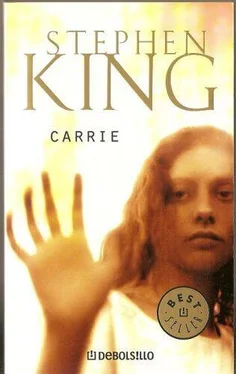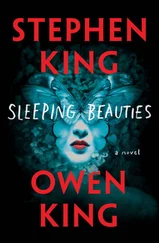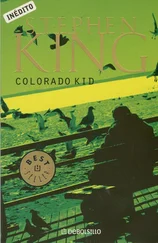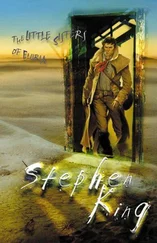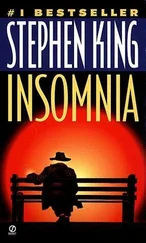Stephen King - Carrie
Здесь есть возможность читать онлайн «Stephen King - Carrie» весь текст электронной книги совершенно бесплатно (целиком полную версию без сокращений). В некоторых случаях можно слушать аудио, скачать через торрент в формате fb2 и присутствует краткое содержание. Год выпуска: 1974, Жанр: Триллер, на английском языке. Описание произведения, (предисловие) а так же отзывы посетителей доступны на портале библиотеки ЛибКат.
- Название:Carrie
- Автор:
- Жанр:
- Год:1974
- ISBN:нет данных
- Рейтинг книги:4.5 / 5. Голосов: 2
-
Избранное:Добавить в избранное
- Отзывы:
-
Ваша оценка:
- 100
- 1
- 2
- 3
- 4
- 5
Carrie: краткое содержание, описание и аннотация
Предлагаем к чтению аннотацию, описание, краткое содержание или предисловие (зависит от того, что написал сам автор книги «Carrie»). Если вы не нашли необходимую информацию о книге — напишите в комментариях, мы постараемся отыскать её.
Carrie — читать онлайн бесплатно полную книгу (весь текст) целиком
Ниже представлен текст книги, разбитый по страницам. Система сохранения места последней прочитанной страницы, позволяет с удобством читать онлайн бесплатно книгу «Carrie», без необходимости каждый раз заново искать на чём Вы остановились. Поставьте закладку, и сможете в любой момент перейти на страницу, на которой закончили чтение.
Интервал:
Закладка:
“But hardly anybody ever finds out that their actions really, actually, hurt other people! People don't get better, they just get smarter. When you get smarter you don't stop pulling the wings off flies, you just think of better reasons for doing it. Lots of kids say they feel sorry for Carrie White-mostly girls, and that's a laugh-but I bet none of them understand what it's like to be Carrie White, every second of every day. And they don't really care.”
“Do you?”
“I don't know!” she cried. “But someone ought to try and be sorry in a way that counts… in a way that means something.”
“All right. I'll ask her.”
“You will?” The statement came out in a flat, surprised way. She had not thought he actually would.
“Yes. But I think she'll say no. You've overestimated my box-office appeal. That popularity stuff is bullshit. You've got a bee in your bonnet about that.”
“Thank you,” she said, and it sounded odd, as if she had thanked an Inquisitor for torture.
“I love you,” he said.
She looked at him, startled. It was the first time he had said it.
From My Name Is Susan Snell (p. 6):
There are lots of people-mostly men-who aren't surprised that I asked Tommy to take Carrie to the Spring Ball. They are surprised that he did it, though, which shows you that the male mind expects very little in the way of altruism from its fellows.
Tommy took her because he loved me and because it was what I wanted. How, asks the skeptic from the balcony, did you know he loved you? Because he told me so, mister. And if you'd known him, that would have been good enough for you, too…
He asked her on Thursday, after lunch, and found himself as nervous as a kid going to his first ice-cream party.
She sat four rows over from him in Period Five study hall, and when it was over he cut across to her through the mass of rushing bodies. At the teacher's desk Mr. Stephens, a tall man just beginning to run to fat, was folding papers abstractedly back into his ratty brown briefcase.
“Carrie?”
“Ohuh?”
She looked up from her books with a startled wince, as if expecting a blow. The day was overcast and the bank of fluorescents embedded in the ceiling was not particularly kind to her pale complexion. But he saw for the first time (because it was the first time he had really looked) that she was far from repulsive. Her face was round rather than oval, and the eyes were so dark that they seemed to cast shadows beneath them, like bruises. Her hair “''as darkish blonde, slightly wiry, pulled back in a bun that was not becoming to her. The lips were full, almost lush, the teeth naturally white. Her body, for the most part, was indeterminate. A baggy sweater concealed her breasts except for token nubs. The skirt was colorful but awful all the same: It fell to a 1958 midshin hem in an odd and clumsy A-line. The calves were strong and rounded (the attempt to conceal these with heathery knee-socks was bizarre but unsuccessful) and handsome.
She was looking up with an expression that was slightly fearful, slightly something else. He was quite sure he knew what the something else was. Sue had been right, and being right, he had just time to wonder if this was doing a kindness or making things even worse.
“If you don't have a date for the Ball, would you want to go with me?”
Now she blinked, and as she did so, a strange thing happened. The time it took to happen could have been no more than the doorway to a second, but afterward he had no trouble recalling it, as one does with dreams or the sensation of deja' vu. He felt a dizziness as if his mind was no longer controlling his body-the miserable, out-of-control feeling he associated with drinking too much and then coming to the vomiting point.
Then it was gone.
“What? What?”
She wasn't angry, at least. He had expected a brief gust of rage and then a sweeping retreat. But she wasn't angry; she seemed unable to cope with what he had said at all. They were alone in the study hall now, perfectly between the ebb of old students and the flow of new ones.
“The Spring Ball,” he said, a little shaken. “It's next Friday and I know this is late notice but-”
“I don't like to be tricked,” she said softly, and lowered her head. She hesitated for just a second and then passed him by. She stopped and turned and he suddenly saw dignity in her, something so natural that he doubted if she was even aware of it. “Do You People think you can just go on tricking me for-ever? I know who you go around with.”
“I don't go around with anyone I don't want to,” Tommy said patiently. “I'm asking you because I want to ask you.” Ultimately, he knew this to be the truth. If Sue was making a gesture of atonement, she was doing it only at secondhand.
The Period Six students were coming in now, and some of them were looking over curiously. Dale Ullman said something to a boy Tommy didn't know and both of them snickered.
“Come on,” Tommy said. They walked out into the hall.
They were halfway to Wing Four-his class was the other way-walking together but perhaps only by accident, when she said, almost too quietly to hear: “I'd love to. Love to.”
He was perceptive enough to know it was not an acceptance, and again doubt assailed him. Still, it was started. “Do it, then. It will be all right. For both of us. We'll see to it.”
“No,” she said, and in her sudden pensiveness she could have been mistaken for beautiful. “It will be a nightmare.”
“I don't have tickets,” he said, as if he hadn't heard. “This is the last day they sell them.”
“Hey, Tommy, you're going the wrong way!” Brent Gillian yelled.
She stopped. “You're going to be late.”
“Will you?”
“Your class,” she said, distraught. “Your class. The bell is going to ring.”
“Will you?”
“Yes,” she said with angry helplessness. “You knew I would.” She swiped at her eyes with the back of her hand.
No, he said. “But now I do. I'll pick you up at seven-thirty.”
“Fine,” she whispered. “Thank you.” She looked as if she might swoon.
And then, more uncertain than ever, he touched her hand.
From The Shadow Exploded (pp. 7~76):
Probably no other aspect of the Carrie White affair has been so misunderstood, second-guessed, and shrouded in mystery as the part played by Thomas Everett Ross, Carrie's ill-starred escort to the Ewen High School Spring Ball.
Morton Cratzchbarken, in an admittedly sensationalized address to The National Colloquium on Psychic Phenomena last year, said that the two most stunning events of the twentieth century have been the assassination of John F. Kennedy in 1963 and the destruction that came to Chamberlain, Maine, in May of 1979. Cratzchbarken points out that both events were driven home to the citizenry by mass media, and both events have almost shouted the frightening fact that, while something had ended, something else had been irrevocably set in motion, for good or ill. If the comparison can be made, then Thomas Ross played the part of a Lee Harvey Oswald-trigger man in a catastrophe. The question that still remains is: Did he do so wittingly or unwittingly?
Susan Snell, by her own admission, was to have been escorted by Ross to the annual event. She claims that she suggested Ross take Carrie to make up for her part in the shower-room incident. Those who oppose this story, most lately led by George Jerome of Harvard, claim that this is either a highly romantic distortion or an outright lie. Jerome argues with great force and eloquence that it is hardly typical of high-school-age adolescents to feel that they have to “atone” for anything-particularly for an offense against a peer who has been ostracized from existing cliques.
Читать дальшеИнтервал:
Закладка:
Похожие книги на «Carrie»
Представляем Вашему вниманию похожие книги на «Carrie» списком для выбора. Мы отобрали схожую по названию и смыслу литературу в надежде предоставить читателям больше вариантов отыскать новые, интересные, ещё непрочитанные произведения.
Обсуждение, отзывы о книге «Carrie» и просто собственные мнения читателей. Оставьте ваши комментарии, напишите, что Вы думаете о произведении, его смысле или главных героях. Укажите что конкретно понравилось, а что нет, и почему Вы так считаете.
